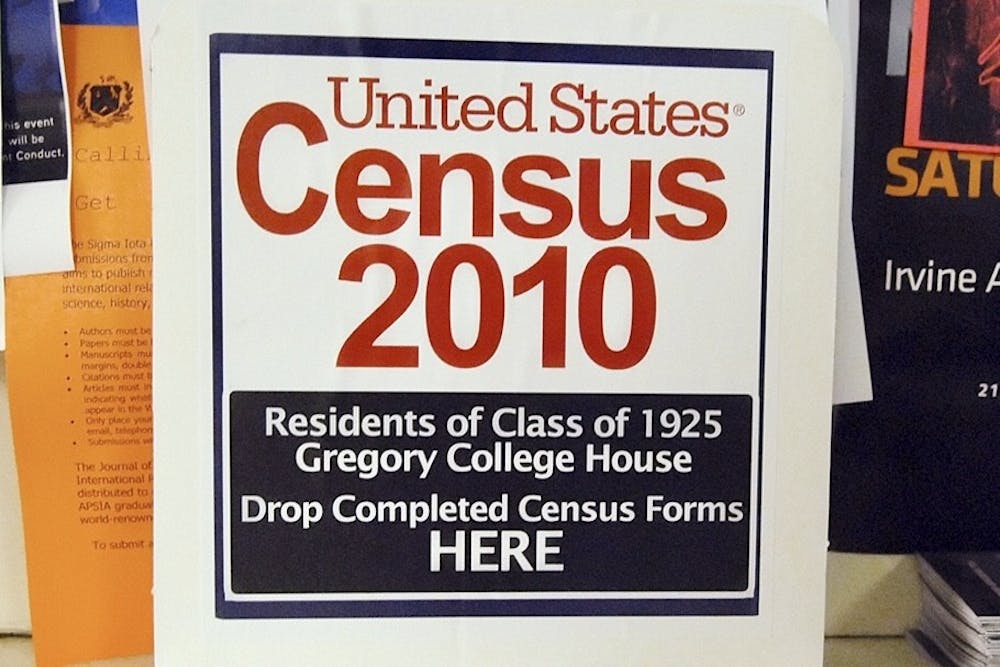
Students that live on campus will be counted through coordination with the university. In 2010, students dropped off their forms in boxes located in college houses.
Credit: Maanvi SinghPennsylvania is joining states throughout the nation in preparing for the 2020 United States census, which will affect national funding allotted to Philadelphia and Penn over the next decade.
The census is a constitutionally mandated count of every living person in the United States which is conducted every 10 years by the U.S. Census Bureau, a nonpartisan government agency within the Department of Commerce. Every person living in Pennsylvania, including international students at Penn and those registered to vote in other states, is eligible to be counted in the state census. The census data and demographic breakdowns of populations are then used to decide the allocation of federal funds related to land development, public safety, and legislation.
Political Science professor Matthew Levendusky said although the idea of the census may seem menial, the process can have a huge impact on government proceedings in Philadelphia and the state as a whole.
“The importance of the census is that its numbers drive federal representation and spending for the entirety of the next decade,” Levendusky said. “It not only shapes how many members of Congress are allocated to Pennsylvania, but every year, hundreds of millions of dollars are allocated via formulas based on the census figures.”
With newly allocated state funding, Pennsylvania will spend an estimated $4 million on improving census-taking measures to ensure the most accurate count possible for the 2020 census. Each household will receive a census form in the mail by April 1.
This year is also the first time that the Census Bureau will ask Americans to complete the survey electronically, with the hope that this will be more convenient for respondents.However, traditional census taking options – such as by mail, phone, or in-person – will still be available.
College junior Jaywon Kim first became interested in the census count after taking an Asian American studies class in which she learned that in general, Asian Americans are most likely to be undercounted because they are the least likely to fill out the form.
“As an Asian American, I found that to be really problematic in that this could lead to disparities in congressional representation and how government funding is allocated, so that definitely motivated me to get more involved,” Kim said.
Kim now works for the Census Bureau and is a student organizer of the upcoming Philly Counts 2020: Census Champion Training taking place in Huntsman Hall on Feb. 28. The event will allow students to learn about local census volunteer opportunities or available employment positions at the Census Bureau. It will also serve to raise awareness about the lasting impact of the upcoming census.
According to Jennifer Braxton, the Media Partnership Specialist at the Philadelphia Regional Census Center, all college students will be counted as residents of where they are living as of April 1, as opposed to where they grew up or where their guardians live. At Penn, the rules are the same for non-Pennsylvanian students as well as international students.
Students that live on campus will be counted through coordination with the University, and students living off campus will receive the form in the same way as any other Philadelphia household, according to Braxton.
Kim said she would also like to see the Penn administration be more vocal about the importance of the census because a lot of students don’t realize how this can affect Penn directly.
“I feel like a lot of people don’t realize how it affects our democratic process directly, especially as college students. Although Penn is a private university, the census can help us get more research funding and money for other academic initiatives on campus,” Kim said.
At Penn in particular, Kim noted that international students are much less likely to fill out the form because they are unable to vote and do not think they are eligible to be counted in the census. This can lead to less funding for the university; for this reason, the Philly Counts event will be directed more specifically towards the international student population.
Additionally, since the census is only conducted once per decade, Kim said that if anyone wants to get involved, the time is now.
“This only happens once every ten years, so if I didn’t volunteer now and take action, I know I’d regret it. We’ll be 30 the next time this happens.”
The Daily Pennsylvanian is an independent, student-run newspaper. Please consider making a donation to support the coverage that shapes the University. Your generosity ensures a future of strong journalism at Penn.
Donate




